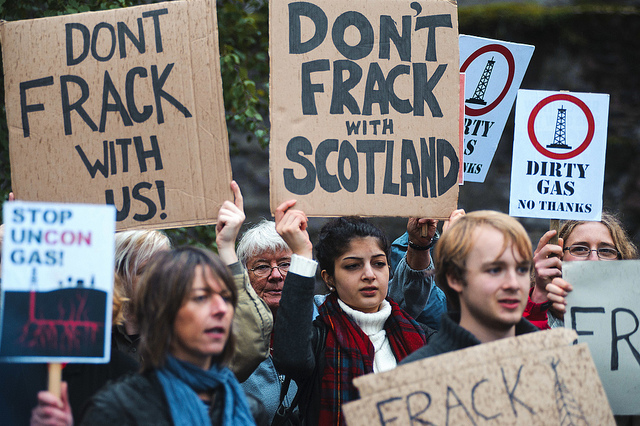Police Scotland has amended its counter terrorism plan after a report by The Ferret revealed they had labelled anti-fracking protesters as “domestic extremists”.
We reported on 16 September 2018 – in an article published in tandem with the Sunday National – that Police Scotland considered opponents of fracking as potential terrorists.
Official documents also disclosed that Police Scotland was trying to infiltrate communities near the Ineos petrochemical plant at Grangemouth, in order to glean information on people involved with peaceful anti-fracking groups.
Fracking campaigners are ‘domestic extremists’, say Police Scotland
The revelations by research group Spinwatch prompted a furious response from anti-fracking groups, who called on the justice committee at the Scottish Parliament to ask Police Scotland to change its approach.
At First Minister’s Questions in the Scottish Parliament, the Scottish Greens raised the issue with Nicola Sturgeon, who promised to speak with the Chief Constable of Police Scotland, Iain Livingstone. The First Minister said that peaceful campaigners should not be considered extremists.
Scottish Green co-convener, Patrick Harvie MSP, described campaigners as “heroes” and questioned the treatment of peaceful demonstrators.
Sturgeon to quiz Police Scotland over branding fracking critics as “extremists”
In response to the outcry, a senior Police Scotland official has written to the Scottish Parliament’s Justice Sub-Committee on Policing, to confirm the 2018-19 annual plan has no reference to fracking campaigners under the heading domestic extremists.
Detective Chief Superintendent, Gerry Mclean wrote: “The Police Scotland Annual Police Plan for 2017-18 did contain the following commentary: ‘There continues to be protests around shale oil and gas extraction and unconventional oil and gas extraction, and unconventional oil and gas extraction, both commonly referred to as ‘fracking’.’
“This paragraph was contained within a wider and diverse section of the annual police plan under the heading of Domestic Extremism.
“Police Scotland does not consider any form of lawful and peaceful protest to constitute domestic extremism; however, we accept that from a presentational perspective a misinterpretation of this position may have been given from the way this small section of the annual police plan was worded and presented.
“No such reference is contained in the current Annual Police Plan for 2018-19.”
Sub-committee convener John Finnie welcomed the confirmation. The Green MSP said: “The right to lawful and peaceful protest is an integral part of our society. Law-abiding citizens who wish to protest peacefully should not have to be concerned about the threat – perceived or real – of being labelled a domestic extremist.
“Changing the wording in the annual police plan to remove this inference is exactly the right thing to do.”
Russell Scott of Spinwatch said: “The change of approach by Police Scotland is the correct thing to do. I hope that the Falkirk force can also provide clarity on its attempts to gather intelligence on the anti-fracking community in the Grangemouth area.
“Elsewhere in the country Special Branch continues to provide significant intelligence on the anti-fracking community and this needs to be addressed as a matter of urgency by national policy makers.
“Members of the public in places like the East Midlands and North Yorkshire who valiantly oppose fracking should be allowed to protest without the risk of being labelled ‘extremists’ or spied on by Special Branch.”
This story was updated at 17.00 on 25th September 2018 to add the comment from Spinwatch.














